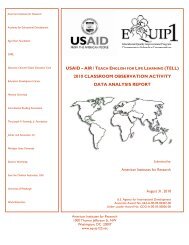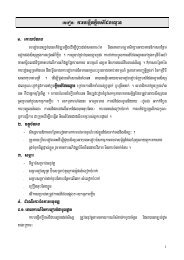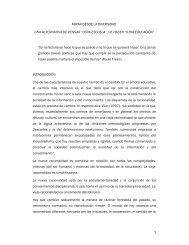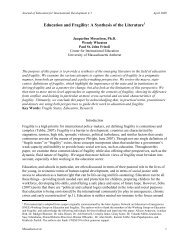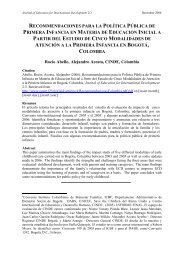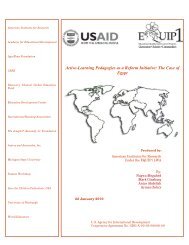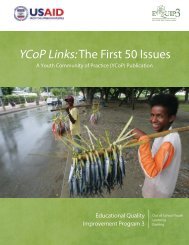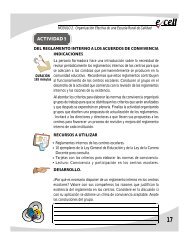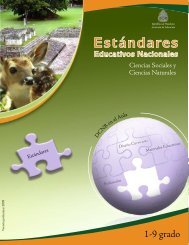The Power of Persistence: Education System ... - EQUIP123.net
The Power of Persistence: Education System ... - EQUIP123.net
The Power of Persistence: Education System ... - EQUIP123.net
Create successful ePaper yourself
Turn your PDF publications into a flip-book with our unique Google optimized e-Paper software.
Institutionally and organizationally, the push for decentralization and privatization<br />
was echoed by global processes <strong>of</strong> market forces and donor recommendations for<br />
streamlining bureaucracies and increasing participation and decision-making for<br />
local entities. All the major donors in El Salvador supported aspects <strong>of</strong> MINED’s<br />
decentralization efforts and the policy was largely adapted from priorities put<br />
forward by the World Bank, IDB, and USAID. <strong>The</strong> management style MINED<br />
adopted and the administrative restructuring that it spearheaded reflected the<br />
new government’s commitment to decentralization and was reinforced by<br />
global trends.<br />
CONCLUSION<br />
Over the past 20 years, El Salvador’s education sector has been characterized by<br />
consistent policies and steady improvement <strong>of</strong> institutional capacity and system<br />
outcomes. Enrollment and completion in the primary and secondary levels have<br />
increased substantially. In EDUCO and other initiatives, El Salvador has developed<br />
internationally recognized innovations in school governance. MINED’s institutional<br />
capacity is among the best in the region, and the country has maintained a high<br />
degree <strong>of</strong> commitment and consensus on education development.<br />
Key factors enabling sustainable and consistent progress over such a lengthy<br />
period include:<br />
• Strong and consistent Ministry <strong>of</strong> <strong>Education</strong> leadership enabled a country-led<br />
development effort. El Salvador demonstrated perhaps the most significant<br />
and sustained level <strong>of</strong> national ownership and leadership in the region. <strong>The</strong><br />
country was living the Paris Declaration before the declaration itself, and<br />
because <strong>of</strong> national leadership rather than donor concessions. At times, this<br />
has created resentment from the donors.<br />
• <strong>The</strong> participatory development <strong>of</strong> a strategy, sector assessment, and two<br />
successive long-term plans provided a framework for working with donors<br />
and gaining societal consensus. <strong>The</strong> extent to which the donor community<br />
supported and recognized the plans’ importance was important. <strong>The</strong><br />
consensus-based planning process was enabled by the continuity <strong>of</strong><br />
MINED’s philosophy.<br />
• <strong>The</strong> stability <strong>of</strong> MINED’s mid-level leadership and technical expertise<br />
contributed to both continuity and deepening institutional capacity. This was<br />
evident in the continuous evolution and improvement <strong>of</strong> core initiatives such<br />
as EDUCO, student testing, curriculum, and information management.<br />
80<br />
SECTION 2: lESSONS fROM COUNTRY CASE STUdIES



